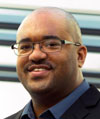

Perspectives is the newsletter of the
Stanford course,
Course News
Next Class Session (on campus) - Thursday, February 10th at 4:00pm PST
Abstract: The development of Assistive Technology benefits from the contributions of many areas of study. Engineering of physical devices plays a crucial role in meeting the needs of the user and improving the human experience. There are many user needs however, that would greatly benefit from systems capable of not only performing passively, but also from devices that can take action to directly help the user. The question becomes "How can an assistive device capable of taking action, determine the best action to take, in order to help the user at a given moment?". This question leads to the field of Robotics, which is the development of 'thinking' machines. While the term 'thinking' here is used very broadly, it can be simplified to the ability to observe a scenario (perception), 'think' or plan about what action to take (this could range from a simple feedback control principle to a machine learning model), then perform some action on the world to change the scenario in some way. Assistive Robotics is the field of study of applying all the advancements of robotics to assistive technology solutions that would benefit from 'thinking' devices. In this talk, I will highlight basic principles of 'thinking' machines, and discuss the application of these principles to assitive technology with a primary focus on work performed in the Stanford Assistive Robotics and Manipulation Laboratory (ARMLab). Biosketch: Monroe Kennedy III received his PhD in Mechanical Engineering and Applied Mechanics, and a Masters in Robotics from the University of Pennsylvania where he was a recipient of both the NSF and GEM graduate research fellowships. His area of expertise is in robotics, specifically the development of theoretical and experimental approaches to perform control and estimation for robotic systems, in particular, robotic manipulation and human-robot collaborative tasks. He applies expertise in dynamical systems analysis, control theory (classical, non-linear, and robust control), state estimation and prediction, motion planning, vision for robotic autonomy, and machine learning. Monroe is the director of the Assistive Robotics and Manipulation Lab (ARMLab) whose broad research objective is to develop technology that improves everyday life by anticipating and acting on the needs of human counterparts. ARMLab specializes in developing intelligent robotic systems that can perceive and model environments, humans and tasks and leverage these models to predict system processes and understand their assistive role. ARMLab focuses heavily on both the analytical and experimental components of assistive technology design. While the application area domain is autonomous assistive technology, the primary focus is robotic assistants (mobile manipulators and humanoids) with the goal of deployment for service tasks that may be highly dynamic and require dexterity, situational awareness, and human-robot collaboration. Upcoming Class Sessions (on campus unless noted otherwise)
Virtual Assistive Technology Faire
Please contact me with your ideas, questions, comments, and project suggestions - or just to say hello. Please continue to stay safe & healthy. Dave Jaffe - Course Instructor
|
|||||||||||||||||||





